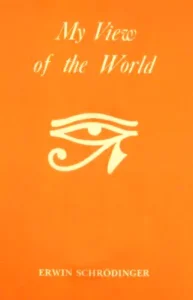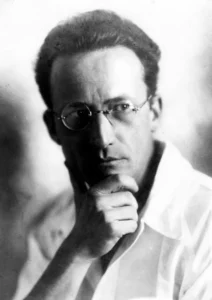What Makes You Makes the Universe: Nobel Laureate Erwin Schrödinger on Quantum Physics, Vedanta, and the Ongoing Mystery of What We Are
INSPIRATIONAL, 11 Sep 2023
Maria Popova | The Marginalian – TRANSCEND Media Service
 To face the question of what makes us who we are with courage, lucidity, and fullness of feeling is to face, with all the restlessness and helplessness this stirs in the meaning-hungry soul, the elemental fact of our choicelessness in the conditions that lead to our existence.
To face the question of what makes us who we are with courage, lucidity, and fullness of feeling is to face, with all the restlessness and helplessness this stirs in the meaning-hungry soul, the elemental fact of our choicelessness in the conditions that lead to our existence.
That is what the Nobel-winning founding father of quantum mechanics Erwin Schrödinger (August 12, 1887–January 4, 1961) addresses in some exquisite passages from My View of the World (public library) — the slender, daring deathbed book containing two long essays penned on either side of his Nobel Prize, thirty-five years apart yet united by the unbroken thread of his uncommon mind unafraid of its own capacity for feeling, that vital capacity for living fully into the grandest open questions of existence.
Schrödinger opens with one swift, awe-striking defense of what scientists dismiss as metaphysics — a realm of knowledge that lies beyond the current scientific tools and modes of truth-extraction, which history attests always reveals more about the limitations of the tools than about the limits of nature’s truths. (Lest we forget, even so pure a form of physics as the hummingbird’s flight was long considered a metaphysical phenomenon — that is, a yet-unsolved phenomenon explained as magic — until science fermented the technology of photography to capture the mechanics of the process.) Echoing Hannah Arendt’s daring indictment that ceasing to ask unanswerable question would mean relinquishing “not only the ability to produce those thought-things that we call works of art but also the capacity to ask all the answerable questions upon which every civilization is founded,” Schrödinger writes:
It is relatively easy to sweep away the whole of metaphysics, as Kant did. The slightest puff in its direction blows it away, and what was needed was not so much a powerful pair of lungs to provide the blast, as a powerful dose of courage to turn it against so timelessly venerable a house of cards.
But you must not think that what has then been achieved is the actual elimination of metaphysics from the empirical content of human knowledge. In fact, if we cut out all metaphysics it will be found to be vastly more difficult, indeed probably quite impossible, to give any intelligible account of even the most circumscribed area of specialisation within any specialised science you please. Metaphysics includes, amongst other things — to take just one quite crude example — the unquestioning acceptance of a more-than-physical — that is, transcendental — significance in a large number of thin sheets of wood-pulp covered with black marks such as are now before you… A real elimination of metaphysics means taking the soul out of both art and science, turning them into skeletons incapable of any further development.
Even as he made his reality-reconfiguring contributions to science and its search for fundamental truth, Schrödinger never relinquished his passionate curiosity about philosophy and the ongoing questions of meaning that kernel every truth in the flesh of consciousness. He was as drawn to Spinoza and Schopenhauer as he was to the ancient Eastern traditions, and especially in their untrammeled common ground of panpsychism — one of the oldest and most notoriously misunderstood theoretical models of consciousness in relation to the universe.
A century after the pioneering Canadian philosopher, psychiatrist, and nature-explorer Richard Maurice Bucke drew inspiration from Whitman to develop his theory of cosmic consciousness, and a century before the emerging science of counterfactuals threw its gauntlet at our fundamental assumptions about the nature of the universe, Schrödinger takes up the parallels between the discoveries of quantum physics and the core ideas of the Hindu philosophy of Vedanta. In what might best be described as an existentialist prose-poem, he invites you to imagine yourself seated on a mountain bench at sunset, beholding a transcendent display of nature:
Facing you, soaring up from the depths of the valley, is the mighty, glacier-tipped peak, its smooth snowfields and hard-edged rock-faces touched at this moment with soft rose-colour by the last rays of the departing sun, all marvellously sharp against the clear, pale, transparent blue of the sky.
According to our usual way of looking at it, everything that you are seeing has, apart from small changes, been there for thousands of years before you. After a while — not long — you will no longer exist, and the woods and rocks and sky will continue, unchanged, for thousands of years after you.
What is it that has called you so suddenly out of nothingness to enjoy for a brief while a spectacle which remains quite indifferent to you?
In a passage evocative of Whitman’s timeless lines from “Crossing Brooklyn Ferry” — “Others will enter the gates of the ferry and cross from shore to shore… Others will see the islands large and small… A hundred years hence, or ever so many hundred years hence, others will see them… I am with you, you men and women of a generation, or ever so many generations hence … Just as you feel when you look on the river and sky, so I felt… Just as any of you is one of a living crowd, I was one of a crowd… What is it then between us?” — Schrödinger answers:
The conditions for your existence are almost as old as the rocks. For thousands of years men have striven and suffered and begotten and women have brought forth in pain. A hundred years ago, perhaps, another man sat on this spot; like you he gazed with awe and yearning in his heart at the dying light of the glaciers. Like you he was begotten of man and born of woman. He felt pain and brief joy as you do. Was he someone else? Was it not you yourself? What is this Self of yours? What was the necessary condition for making the thing conceived this time into you, just you and not someone else? What clearly intelligible scientific meaning can this ‘someone else’ really have? If she who is now your mother had cohabited with someone else and had a son by him, and your father had done likewise, would you have come to be? Or were you living in them, and in your father’s father… thousands of years ago? And even if this is so, why are you not your brother, why is your brother not you, why are you not one of your distant cousins? What justifies you in obstinately discovering this difference — the difference between you and someone else — when objectively what is there is the same?
[…]
Inconceivable as it seems to ordinary reason, you — and all other conscious beings as such — are all in all. Hence this life of yours which you are living is not merely a piece of the entire existence, but is in a certain sense the whole.
Once we fathom this fundamental reality of interbeing, Schrödinger observes, it becomes impossible to wish anything for ourselves that we do not wish for everyone else or to harm anyone else without harming ourselves:
It is the vision of this truth (of which the individual is seldom conscious in his actions) which underlies all morally valuable activity.
A decade later, in a lovely testament to Schrödinger’s insistence on the indivisibility of science and art in addressing those grandest unanswered question, Iris Murdoch — one of the vastest minds and finest literary artists of her time, and of all time — captured this elemental truth in her case for art as “an occasion for unselfing,” observing:
The self, the place where we live, is a place of illusion. Goodness is connected with the attempt to see the unself… to pierce the veil of selfish consciousness and join the world as it really is.
Complement this fragment of Schrödinger’s My View of the World — a superb read in its slim totality — with the poetic physicist Alan Lightman on selfhood, mortality, and what makes life worth living, then revisit Alan Watts — who introduced the Western mind to Vedanta and its consonance with “the new physics” of the quantum world — on the self, the universe, and becoming who we really are.
_______________________________________
 My name is Maria Popova — a reader, a wonderer, and a lover of reality who makes sense of the world and herself through the essential inner dialogue that is the act of writing. The Marginalian (which bore the unbearable name Brain Pickings for its first 15 years) is my one-woman labor of love, exploring what it means to live a decent, inspired, substantive life of purpose and gladness. Founded in 2006 as a weekly email to seven friends, eventually brought online and now included in the Library of Congress permanent web archive, it is a record of my own becoming as a person — intellectually, creatively, spiritually, poetically — drawn from my extended marginalia on the search for meaning across literature, science, art, philosophy, and the various other tendrils of human thought and feeling. A private inquiry irradiated by the ultimate question, the great quickening of wonderment that binds us all: What is all this? (More…)
My name is Maria Popova — a reader, a wonderer, and a lover of reality who makes sense of the world and herself through the essential inner dialogue that is the act of writing. The Marginalian (which bore the unbearable name Brain Pickings for its first 15 years) is my one-woman labor of love, exploring what it means to live a decent, inspired, substantive life of purpose and gladness. Founded in 2006 as a weekly email to seven friends, eventually brought online and now included in the Library of Congress permanent web archive, it is a record of my own becoming as a person — intellectually, creatively, spiritually, poetically — drawn from my extended marginalia on the search for meaning across literature, science, art, philosophy, and the various other tendrils of human thought and feeling. A private inquiry irradiated by the ultimate question, the great quickening of wonderment that binds us all: What is all this? (More…)
Go to Original – themarginalian.org
Tags: Cosmos, Inspirational, Life, Metaphysics, Nobel Prizes, Philosophy, Spirit soul, Spiritual Science, Universe
DISCLAIMER: The statements, views and opinions expressed in pieces republished here are solely those of the authors and do not necessarily represent those of TMS. In accordance with title 17 U.S.C. section 107, this material is distributed without profit to those who have expressed a prior interest in receiving the included information for research and educational purposes. TMS has no affiliation whatsoever with the originator of this article nor is TMS endorsed or sponsored by the originator. “GO TO ORIGINAL” links are provided as a convenience to our readers and allow for verification of authenticity. However, as originating pages are often updated by their originating host sites, the versions posted may not match the versions our readers view when clicking the “GO TO ORIGINAL” links. This site contains copyrighted material the use of which has not always been specifically authorized by the copyright owner. We are making such material available in our efforts to advance understanding of environmental, political, human rights, economic, democracy, scientific, and social justice issues, etc. We believe this constitutes a ‘fair use’ of any such copyrighted material as provided for in section 107 of the US Copyright Law. In accordance with Title 17 U.S.C. Section 107, the material on this site is distributed without profit to those who have expressed a prior interest in receiving the included information for research and educational purposes. For more information go to: http://www.law.cornell.edu/uscode/17/107.shtml. If you wish to use copyrighted material from this site for purposes of your own that go beyond ‘fair use’, you must obtain permission from the copyright owner.
